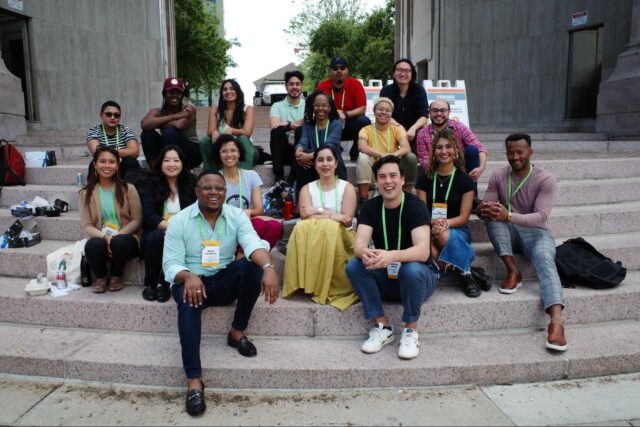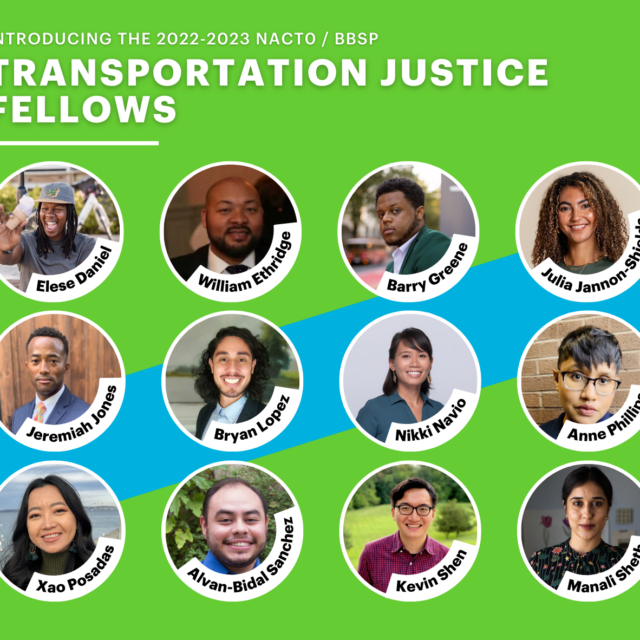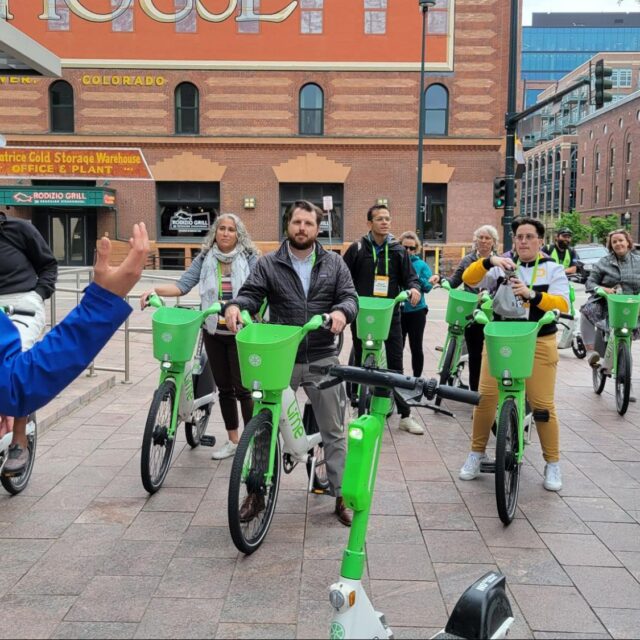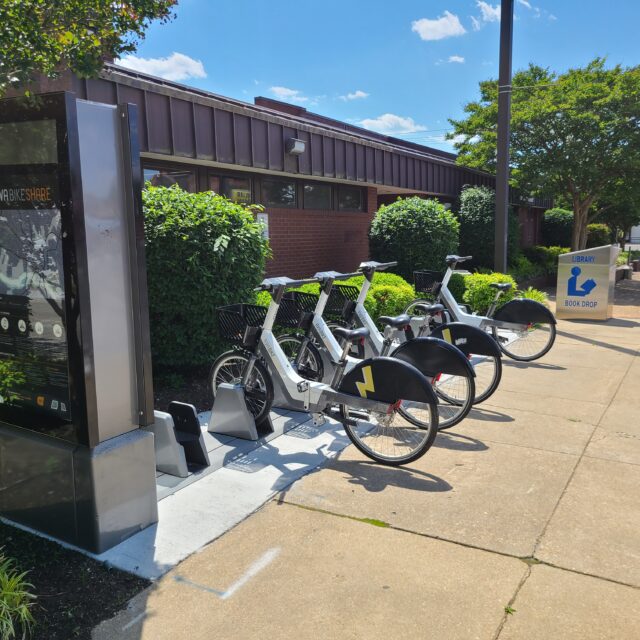Fellows Reflect on a Year of Transportation Justice Work
by Fielding Hong, NACTO Program Manager
July 12, 2023
Members of this year’s Transportation Justice Fellowship share their experiences with the program, which was designed to support and amplify professionals of color working in the mobility field.

The 2022 – 2023 Transportation Justice Fellows and BBSP staff at NACTO’s Designing Cities Conference in Denver.
In 2021, the Better Bike Share Partnership (BBSP) launched the Transportation Justice Fellowship. Led by The National Association of City Transportation Officials (NACTO), the purpose of the fellowship is to support and amplify professionals of color working to embed mobility justice in transportation agencies and beyond. Now in its third year, the fellowship has successfully graduated two cohorts of 12 individuals from across the U.S.
The 2022-2023 cohort launched last fall — over the course of eight months, the fellows met regularly with NACTO, BBSP, and facilitators from The Wright Institute to build community and explore ways to operationalize equity in the field. Throughout the program, fellows collaborated on small projects and received one-on-one coaching from experts working at the intersections of transportation and social justice (one fellow, Barry Green Jr., even guest-wrote a BBSP blog post).
At the NACTO Designing Cities Conference in Denver, Colorado, fellows presented their final research projects at the Meet the Cities event, organized and hosted a BIPOC Breakfast Meet and Greet, spoke on panels, participated in workshops, and networked with more than 1,300 professionals from across the transportation field.
On June 22, the 2022 – 2023 Transportation Justice Fellowship concluded with a celebration of achievements and a ceremony of acknowledgments. BBSP, the Wright Institute, and the fellows’ coaches had the opportunity to share reflections on the fellows’ achievements and growth. As one fellow shared, “I entered the Fellowship thinking I was just ‘good enough’ to be here, and am now leaving with the confidence that I am more than enough to lead… Becoming more gentle and believing in myself has been such a valuable takeaway from this fellowship.”
If you’re interested in applying for the 2023-2024 Transportation Justice Fellowship, applications will open in September. Stay tuned for more information! In the meantime, read on for reflections from four of the fellows on their experiences in the program.
What has been your favorite moment from the fellowship overall?
“After months of Zoom calls, I couldn’t help but have the widest genuine smile when meeting folks for the first time in Denver! That stuff has some magic to it — feeling so connected to folks, each of us with our own energy and perspective, but also together with a shared commitment towards a just world.”
– Kevin Shen, Northeast Transportation Policy Analyst/Advocate at the Union of Concerned Scientists
Why do you think a fellowship like this is important?
“Through the speakers, conference, and cohort, it has created a space to share questions and thoughts with one another as we navigate our personal roles and responsibilities at our jobs and in our professions. It’s so important to have people you trust and respect to soundboard these questions and thoughts with and the fellowship had a huge role in facilitating this.”
– Manali Sheth, Program Manager at the Shared-Use Mobility Center
“Advocating for transportation justice is lonely work. It is even lonelier work when you are a person of color in white institutional spaces. In addition to the mentorship and training I received during the fellowship, it was incredibly affirming to be in community with other BIPOC transportation justice advocates from all over the US and have the support of the NACTO and BBSP teams.”
– Anne Phillips, Ph.D., Founding Principal at Just Cities Collective
How do you see the Fellowship helping you in your career?
“I launched my consulting business, Just Cities Collective, in September 2022. At the time, I was finishing up a yearlong equity-focused fellowship through FUSE Corps, and I was unsure of whether a transportation equity consulting business was feasible in the Research Triangle region. The fellowship provided me with invaluable mentorship from someone I’ve long looked up to — Tamika L. Butler — and exposure to many other experts in the field of mobility justice at a critical point in my career.
At a time when there are not a lot of credentials to do transportation equity/mobility justice work, the fellowship has helped to show that the work that I want to do is not a fad, but integral to the transportation field. Less than six months after my transition to becoming a full-time consultant, I’m pleased to share that transportation equity consulting is feasible in my region. I have a full slate of projects, and more than half of them are directly related to transportation equity.”
– Anne Phillips, Ph.D., Founding Principal at Just Cities Collective
What’s the biggest challenge or issue you see facing the transportation and mobility field currently?
“I think one of the biggest challenges we are facing as an industry is addressing pedestrian fatality rates which are reaching all-time highs across the country. This is extremely alarming, and we all know that BIPOC and lower-income communities bear a disproportionate burden of these impacts.”
– Nikki Navio, Transportation Program Manager at the Denali Commission
“Climate justice. In the Sun Belt, like the rest of the nation, we continue to overinvest in single-occupancy vehicle infrastructure and underinvest in walking, cycling, and transit. This is codified in legislation like North Carolina’s Strategic Transportation Investments law. People are counting on single occupancy electric vehicles (SOEV) to save us from a rapidly warming climate.
Many of us know that SOEVs won’t save us, but it is easier to believe that they will so that we don’t have to change our travel behaviors. We also know that the batteries that power these vehicles are linked to severe human rights violations in the Congo. We need to take a more systemic view of justice when it comes to transportation -— one that examines how US transportation policies not only perpetuate mobility injustice nationally but are exacerbating the climate crisis (which disproportionately burdens those in the Global South).”
– Anne Phillips, Ph.D., Founding Principal at Just Cities Collective
“Changing our transportation system can take decades, but the urgency of the crises we face cannot wait for that. That’s why it’s so important that advocacy for road/bike/pedestrian safety or mitigating climate change or care-first public safety is rooted in an approach that shifts power to and addresses a long history of harm in marginalized communities. This requires solidarity across movements that can often be siloed. There’s no time to get it wrong!”
– Kevin Shen, Northeast Transportation Policy Analyst/Advocate at the Union of Concerned Scientists
What’s something that excites you right now about the transportation and mobility field?
“It’s exciting to see the amount of federal funding opportunities for communities to capitalize on for transportation infrastructure changes in order to make safer and more connected communities. I’m excited to see the impact this may have for the future and the role I can hopefully play to help.”
– Nikki Navio, Transportation Program Manager at the Denali Commission
“That mobility justice is here to stay. When I spoke to the Island Press representative at Designing Cities, they told me that they had received the most inquiries about Veronica O. Davis’ “Inclusive Transportation” (which wasn’t even out at the time) during the conference. The book is the number one new release on a certain book-selling website that shall remain nameless. I think we have gotten to a point where we cannot have conversations about transportation without talking about transportation equity and mobility justice. Ultimately, I think the fellowship has prepared me for leadership at a critical time in the transportation field.”
– Anne Phillips, Ph.D., Founding Principal at Just Cities Collective
“Observing how cost and inconvenience is a powerful tool to nudge human behavior towards public transit, shared mobility, or walking/rolling all around me!”
– Manali Sheth, Program Manager at the Shared-Use Mobility Center
The Better Bike Share Partnership is funded by The JPB Foundation as a collaboration between the City of Philadelphia, the National Association of City Transportation Officials (NACTO), and the PeopleForBikes Foundation to build equitable and replicable bike share systems. Follow us on LinkedIn, Facebook, Twitter, and Instagram, or sign up for our weekly newsletter. Have a question or a story idea? Email kiran@peopleforbikes.org.



